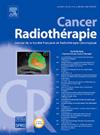Tumour and normal tissue radiosensitivity: 2025 update
IF 1.4
4区 医学
Q4 ONCOLOGY
引用次数: 0
Abstract
The personalization of oncology and radiation treatments is becoming increasingly crucial in patient care. Over the past few decades, numerous assays have been developed to predict tumour response and assess the risk of radiation-induced toxicity. These tests have not yet been integrated into routine clinical practice, but recent advances in radiation oncology are paving the way for personalized strategies that consider both tumour recurrence risk and normal tissue reactions. Regarding tumour radiosensitivity prediction, no tests are currently in clinical use, although the radiosensitivity index and Genome-based Model for Adjusting Radiotherapy Dose assays appear to be the most promising, with level II evidence. Development of radiomics has also made it possible to envisage new biomarkers. Prospective studies are ongoing. For normal tissue radiosensitivity prediction, single nucleotide polymorphims in prostate cancer and head and neck cancer patients, and the radiation-induced CD8 T-lymphocyte apoptosis assay for breast and prostate cancers are supported by level I evidence. These tests can be offered prior to the initiation of radiotherapy to tailor treatments based on both tumour and normal tissue radiosensitivity risks.
肿瘤和正常组织放射敏感性:2025年更新
肿瘤和放射治疗的个性化在患者护理中变得越来越重要。在过去的几十年里,已经开发了许多检测方法来预测肿瘤反应和评估辐射引起的毒性风险。这些测试尚未纳入常规临床实践,但放射肿瘤学的最新进展正在为考虑肿瘤复发风险和正常组织反应的个性化策略铺平道路。关于肿瘤放射敏感性预测,目前还没有临床使用的测试,尽管放射敏感性指数和基于基因组的放疗剂量调整模型测定似乎是最有希望的,具有二级证据。放射组学的发展也使设想新的生物标志物成为可能。前瞻性研究正在进行中。对于正常组织的放射敏感性预测,前列腺癌和头颈癌患者的单核苷酸多态性,以及乳腺癌和前列腺癌的辐射诱导CD8 t淋巴细胞凋亡试验均得到I级证据的支持。这些测试可在放射治疗开始前进行,以根据肿瘤和正常组织放射敏感性风险定制治疗方案。
本文章由计算机程序翻译,如有差异,请以英文原文为准。
求助全文
约1分钟内获得全文
求助全文
来源期刊

Cancer Radiotherapie
医学-核医学
CiteScore
2.20
自引率
23.10%
发文量
129
审稿时长
63 days
期刊介绍:
Cancer/radiothérapie se veut d''abord et avant tout un organe francophone de publication des travaux de recherche en radiothérapie. La revue a pour objectif de diffuser les informations majeures sur les travaux de recherche en cancérologie et tout ce qui touche de près ou de loin au traitement du cancer par les radiations : technologie, radiophysique, radiobiologie et radiothérapie clinique.
 求助内容:
求助内容: 应助结果提醒方式:
应助结果提醒方式:


